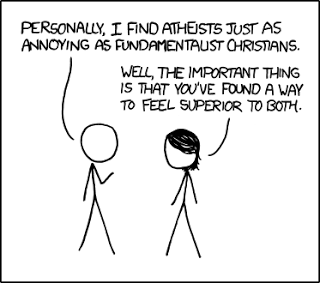I’m a bit of an ethical utilitarian; that is, I generally think an action is good if it has good effects. I can see some problems with it. Since we can’t always predict the effects of our actions, utilitarianism works best in retrospect. And defining ‘good’ has its own problems, but I know it when I see it.
But I like to hear the other side. So, for the second time in two days, I went to hear a Christian have a bash at a competing philosophy. I wasn’t expecting to hear how Christianity improves on utilitarianism. They never seem to do that. They just say God is wonderful. But I hoped to get a better idea of other views on ethics.
The speaker mentioned the above problems with utilitarianism, all of which I would have happily conceded. I could have done without the straw men, though. (Did you know that utilitarianism can lead to gulags and gambling, if you define ‘good’ stupidly enough?)
So what was his great idea for ethical behaviour? It’s quite an eye-opener: An action is good if god says it is. I asked him how he could know what god wants, when believers have come to many different conclusions about that. His answer: He reads the Bible and decides. That’s unlikely to lead to any ambiguity.
At the end of the presentation, I was unconvinced that his system of ethics held any advantages. Sure, he was against gambling and gulags, but a utilitarian could be against both of those things. The difference is that they’d be against it because it was bad for people, and he’d be against it because a god said so. I had a Socratic realisation that I knew one thing more than he did: I knew that my ethical system was made by humans. His system of ethics was made by humans, too, but he didn’t know that. He thought that his system of ethics was handed down by the supreme creator of the universe. I suspect that would make him less capable of compromise.
Despite the presentation, I was quite encouraged by the Christians I met. They asked some good (and in some cases, thorny) questions, including a brief touch on Euthyphro’s dilemma. Also, the ones I met were actually in the process of reading Dawkins and Dennett. Are atheists reading Eagleton and Plantinga? Ugh, no thank you. If we tried to reciprocate, the Christians would be getting the better end of that deal. Still, I respect their curiosity and willingness to check out the other side.





Recent Comments